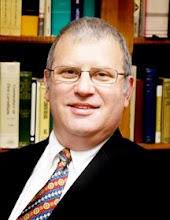Clowns to the left of me,
Jokers to the right, here I am
Stuck in the middle with you.
From "Stuck in the Middle" by Stealers Wheel
OK, this is a bit tongue in cheek, but I thought it was a good way to begin this post. I am going to be taking at least a two week break from blogging on A Trinity of 3, and quite frankly, this may be the last post. Next week is finals, and then some time off to reflect on next steps.
It has been an interesting journey. Those of you who stopped by, I thank you. Those who stopped by and read some posts, I thank you. Those of you who stopped by, read some posts and commented, I thank you all the more.
Studying the Word is profitable, you never come away less than what you came to the Bible with. I find this study in trinitarian theology to have been profitable as well.
We might say that God SPIRIT is everywhere creation is not. For those who are Christians, redeemed by Christ’s death at Calvary, finite creation constitutes an enormous crib over and around which the Triune God hovers, affectionately caring for his own. All creation will someday recognize the greatness and beauty of God, together with the unfathomable debt it owes to the Almighty for its existence, preservation and provision of salvation in Jesus Christ. The deep comprehension of our indebtedness to God may be our primary role as his creation.
Dr. J. Scott Horrell's Class Presentation -Trinitarianism
We are deeply indebted to the Triune God for our very existence. As far as I can tell, we can never pray too much to Him, give Him too much praise and worship, spend too much time studying, reflecting on and trying to emulate His attributes. It is never time that is not personally enriching, it is never not edifying.
Nevertheless, there is no more blessed glory than that glory given by one member of the Holy Trinity to the other, each wholly comprehending and exalting the magnifificence of the other.
Dr. J. Scott Horrell's Class Presentation - Trinitarianism
However, we can never approach the Godhead in depth and richness of emotion, love or community within. But it sure is fun and self revealing to try.







